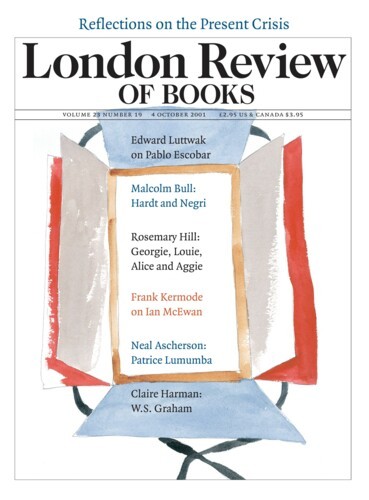I, Morgan, whom the Romans call Pelagius,
Am back in my own place, my green Cathures*
By the frisky firth of salmon, by the open sea
Not far, place of my name, at the end of things
As it must seem. But it is not a dream
Those voyages, my hair grew white at the tiller,
I have been where I say I have been,
And my cheek still burns for the world.
That sarcophagus by the Molendinar –
Keep the lid on, I am not stepping into it yet!
I used to think of the grey rain and the clouds
From my hot cave in the Negev, I shooed
The scuttle of scorpions. I had a hat –
You should have seen me – against the sun
At its zenith in that angry Palestine.
I spoke; I had crowds; there was a demon in me.
There had been crowds four centuries before,
And what had come of that? That was the question.
I did not keep back what I had to say.
Some were alarmed. They did not like my red hair.
But I had a corps of friends who shouldered
Every disfavour aside, took ship with me
Westward over the heaving central sea.
We came to Carthage then, and not alone.
The city was seething livid with refugees.
Such scenes, such languages! Such language!
The Goths were in Rome. I saw a master
I had studied under, wild-eyed,
Clutching tattered scrolls, running.
I saw a drift of actors with baskets
Brimming broken masks, they gestured
Bewildered beyond any mime.
I saw a gladiator with half a sword.
I heard a Berber’s fiddle twang like the end of a world.
Morgan, I said to myself, take note,
Take heart. In a time of confusion
You must make a stand. There is a chrysalis
Throbbing to disgorge oppression and pessimism,
Proscription, prescription, conscription,
Praying mantises. Cut them down!
One stood against me:
Distinguished turncoat, ex-Manichee, ex this and that,
Preacher of chastity with a son in tow,
A Christian pistoned by new-found fervour,
Born of the desert sand in occupied land,
Born my exact coeval but not my coadjutor,
Bishop in Hippo brandishing anathemas,
Bristling with intelligence not my intelligence,
Black-hearted but indefatigable –
Augustine! You know who you are
And I know who you are and we shall die
Coeval as we came to life coeval.
We are old. The dark is not far off.
It is four hundred years now since those nails
Were hammered in that split the world
And not just flesh. Text and anti-text
Crush the light. You can win,
Will win, I can see that, crowd me out
With power of councils, but me –
Do you know me, can you believe
I have something you cannot have –
My city, not the city of God –
It is to come, and why, do you know why?
Because no one will believe without a splash from a font
Their baby will howl in eternal cold, or fire,
And no one will suffer the elect without merit
To lord it over a cringing flock, and no one
Is doomed by Adam’s sin to sin for ever,
And who says Adam’s action was a sin,
Or Eve’s, when they let history in.
Sometimes when I stand on Blythswood Hill
And strain my eyes (they are old now) to catch
Those changing lights of evening, and the clouds
Going their fiery way towards the firth,
I think we must just be ourselves at last
And wait like prophets – no, not wait, work! –
As prophets do, to see the props dissolve,
The crutches, threats, vain promises,
Altars, ordinances, comminations
Melt off into forgetfulness.
My robe flaps; a gull swoops; man is all.
Cathurian towers will ring this hill.
Engines unheard of yet will walk the Clyde.
I do not even need to raise my arms,
My blessing breathes with the earth.
It is for the unborn, to accomplish their will
With amazing, but only human, grace.
Send Letters To:
The Editor
London Review of Books,
28 Little Russell Street
London, WC1A 2HN
letters@lrb.co.uk
Please include name, address, and a telephone number.

